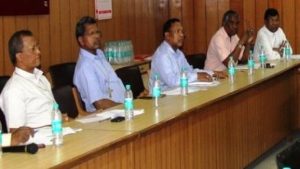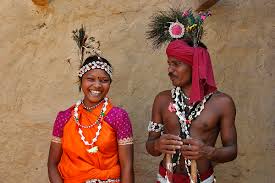Over the years, social scientists and tribal activists in India have observed what appears to be a systematic scheme to move tribal people off their lands. Human rights organisations and a broad segment of social workers have observed how in the past few years, tribal communities are being systematically alienated from their traditional land holdings, all under the garb of ‘national interest’. Those who benefit from such practices are the industrialists.
Things have come to such a pass that even India’s tribal Catholic bishops, who usually concern themselves with religious matters, have sought the intervention of President Pranab Mukherjee to ensure the rights of millions of tribal (Adivasi) people.

In a memorandum, dated May 10, and signed by tribal bishops from six states, they said they were “saddened” by the policies of state governments that have trampled over the rights of the indigenous people. They want the president “to protect the land, forest and socio-cultural rights of tribal people.”
“Land is the only means of livelihood and sustenance” for most tribal people, as 90 percent of them are dependent on agriculture or allied activities in their ancestral land, the bishops said.
They noted that the Union Government and most state governments, “have taken various actions to alienate tribal people from their land on a massive scale to facilitate industrialists.”
In the most recent example, Jharkhand government amended two laws that guaranteed the protection of tribal land used for agriculture. The government declared their land as non-agricultural and, since non-agricultural land does not come under the purview of protective legislation, tribal people can be removed from the land, by force if necessary.
“Once alienated from their land, these tribal races of India will be lost forever similar to what happened in the USA, Canada, Australia and New Zealand in past centuries,” the bishops said.
Large-scale land acquisition is going on in the tribal districts of Chhattisgarh and Odisha states and “the entire tribal population of these districts will also be lost forever,” they said.
The federal government enacted the Forest Rights (Scheduled Tribes & Customary Forest dwellers) Act in 2006 to restore the rights of tribal people and promised that their land would be community-owned. However, the provisions have not yet been implemented.
Jharkhand state was created in 2000 purportedly to safeguard tribal interests. Even so, the government has allowed migrants to swarm the state threatening indigenous languages, customs and traditions, the bishops said.
Although the Indian constitution guarantees religious and linguistic minorities the right to establish and manage their own educational institutions, Jharkhand government has been interfering in the affairs of church-managed schools, says a media report.
The Catholic Church runs more than 900 institutions in Jharkhand. However, state authorities set conditions for staff appointments, stalled grants and imposed their own syllabus.
“We have been finding it extremely difficult to administer our institutions which have contributed so much to nation-building,” the bishops said.
The memorandum also spoke about the harassment Christians face especially in Jharkhand. Recently, state police launched a drive to collect information on Christian churches and sent out a questionnaire asking pastors about their political leanings, relationship to extremist groups, bank accounts and income.
The tone of the questionnaire was “that all Christian churches and their institutions are engaged in anti-national and criminal activities. This created a sense of fear and insecurity among Christians,” the bishops said.
India has some 104 million tribal people, forming 9 percent of the country’s 1.2 billion population, according to 2011 census. An estimated 30 percent of India’s 27 million Christians are also tribal people, particularly in eastern and central parts.
Father Stanislaus Tirkey, secretary of the Indian Catholic bishops’ office for tribal people told a news agency that indigenous people are facing the same problems every state and “we plan to address it collectively.”


